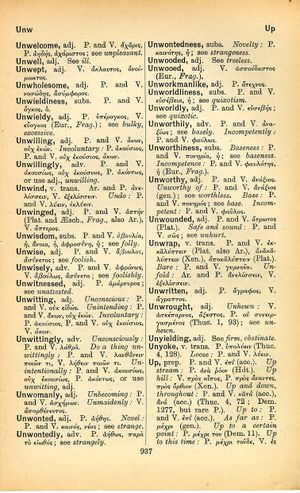up: Difference between revisions
Γάμος γὰρ ἀνθρώποισιν εὐκταῖον κακόν → Conubium homini inire votivum est malum → Die Ehe ist den Menschen ein erflehtes Leid
m (Text replacement - "<b class="b2">Av.</b>" to "Av.") |
m (Woodhouse1 replacement) |
||
| Line 1: | Line 1: | ||
{{Woodhouse1 | {{Woodhouse1 | ||
|Text=[[File:woodhouse_937.jpg|thumb|link={{filepath:woodhouse_937.jpg}}]] | |Text=[[File:woodhouse_937.jpg|thumb|link={{filepath:woodhouse_937.jpg}}]] | ||
===preposition=== | |||
P. and V. ἐπί (acc.). | [[prose|P.]] and [[verse|V.]] [[ἐπί]] (acc.). | ||
[[up stream]]: [[prose|P.]] [[ἀνὰ ῥόον]] (Herodotus). | |||
[[up hill]]: [[verse|V.]] [[πρὸς αἶπος]], [[prose|P.]] [[πρὸς ἄναντες]], [[πρὸς ὄρθιον]] ([[Xenophon|Xen.]]). | |||
[[up and down]], [[throughout]]: [[prose|P.]] and [[verse|V.]] [[κατά]] (acc.), [[ἀνά]] (acc.) ([[Thucydides|Thuc.]] 4, 72; [[Demosthenes|Dem.]] 1277, but rare [[prose|P.]]). | |||
[[up to]]: [[prose|P.]] and [[verse|V.]] [[ἐπί]] (acc.). | |||
[[as far as]]: [[prose|P.]] [[μέχρι]] (gen.). | |||
[[up to a certain point]]: [[prose|P.]] [[μέχρι του]] ([[Demosthenes|Dem.]] 11). | |||
[[up to this time]]: [[prose|P.]] [[μέχρι τοῦδε]], [[verse|V.]] [[ἐς τόδ' ἡμέρας]] ([[Euripides|Eur.]], [[alc. 9]]), [[prose|P.]] and [[verse|V.]] [[δεῦρο]] ([[Plato]] and [[Euripides|Eur.]], ''[[Heraclidae]]'' 848); see [[hitherto]]. | |||
[[come up with]], [[reach]]: [[prose|P.]] and [[verse|V.]] [[ἐξικνεῖσθαι]] (gen.); see [[reach]]. | |||
[[overtake]]: [[prose|P.]] [[ἐπικαταλαμβάνειν]]; see [[overtake]]. | |||
[[well up in]], [[versed in]]: [[prose|P.]] and [[verse|V.]] [[ἔμπειρος]] (gen.). | |||
[[be well up in an author]]: [[Aristophanes|Ar.]] and [[prose|P.]] [[πατεῖν]] (acc.) ([[Aristophanes|Ar.]], Av. 471 and [[Plato]], ''[[Phaedrus]]'' 273A). | |||
===adverb=== | |||
P. and V. [[ἄνω]], Ar. and P. [[ἐπάνω]]. | [[prose|P.]] and [[verse|V.]] [[ἄνω]], [[Aristophanes|Ar.]] and [[prose|P.]] [[ἐπάνω]]. | ||
[[up and down]]: [[prose|P.]] and [[verse|V.]] [[ἄνω κάτω]], [[ἄνω τε καὶ κάτω]], [[prose|P.]] [[ἄνω καὶ κάτω]]. | |||
[[hither and thither]]: see under [[thither]]. | |||
[[the up country]]: [[prose|P.]] [[ἡ μεσογεία]]; see [[inland]]. | |||
[[go up country]], v.: [[prose|P.]] [[ἀνέρχεσθαι]] ([[Thucydides|Thuc.]] 8, 50), [[ἀναβαίνειν]]. | |||
[[be up]] (of [[time]]), [[be passed]]: [[prose|P.]] and [[verse|V.]] [[παρελθεῖν]] (2nd aor. of [[παρέρχεσθαι]]). | |||
[[go up]]: [[prose|P.]] and [[verse|V.]] [[ἀνέρχεσθαι]], [[Aristophanes|Ar.]] and [[prose|P.]] [[ἀναβαίνειν]]. | |||
[[set up]]: see under [[set]]. | |||
[[stand up]]: [[prose|P.]] and [[verse|V.]] [[ἀνίστασθαι]]; see [[rise]]. | |||
[[it is all up with me]]: use [[prose|P.]] and [[verse|V.]] [[οἴχομαι]] ([[Plato]]); see [[be undone]]. | |||
[[shall we say it was all up with these things]]? [[prose|P.]] [[πάντα ἔρρειν ταῦτα… φήσομεν]]; ([[Plato]] Leges 677C). | |||
}} | }} | ||
Revision as of 08:49, 20 May 2020
English > Greek (Woodhouse)
preposition
up stream: P. ἀνὰ ῥόον (Herodotus).
up hill: V. πρὸς αἶπος, P. πρὸς ἄναντες, πρὸς ὄρθιον (Xen.).
up and down, throughout: P. and V. κατά (acc.), ἀνά (acc.) (Thuc. 4, 72; Dem. 1277, but rare P.).
up to a certain point: P. μέχρι του (Dem. 11).
up to this time: P. μέχρι τοῦδε, V. ἐς τόδ' ἡμέρας (Eur., alc. 9), P. and V. δεῦρο (Plato and Eur., Heraclidae 848); see hitherto.
come up with, reach: P. and V. ἐξικνεῖσθαι (gen.); see reach.
overtake: P. ἐπικαταλαμβάνειν; see overtake.
well up in, versed in: P. and V. ἔμπειρος (gen.).
be well up in an author: Ar. and P. πατεῖν (acc.) (Ar., Av. 471 and Plato, Phaedrus 273A).
adverb
P. and V. ἄνω, Ar. and P. ἐπάνω.
up and down: P. and V. ἄνω κάτω, ἄνω τε καὶ κάτω, P. ἄνω καὶ κάτω.
hither and thither: see under thither.
the up country: P. ἡ μεσογεία; see inland.
go up country, v.: P. ἀνέρχεσθαι (Thuc. 8, 50), ἀναβαίνειν.
be up (of time), be passed: P. and V. παρελθεῖν (2nd aor. of παρέρχεσθαι).
go up: P. and V. ἀνέρχεσθαι, Ar. and P. ἀναβαίνειν.
stand up: P. and V. ἀνίστασθαι; see rise.
it is all up with me: use P. and V. οἴχομαι (Plato); see be undone.
shall we say it was all up with these things? P. πάντα ἔρρειν ταῦτα… φήσομεν; (Plato Leges 677C).

